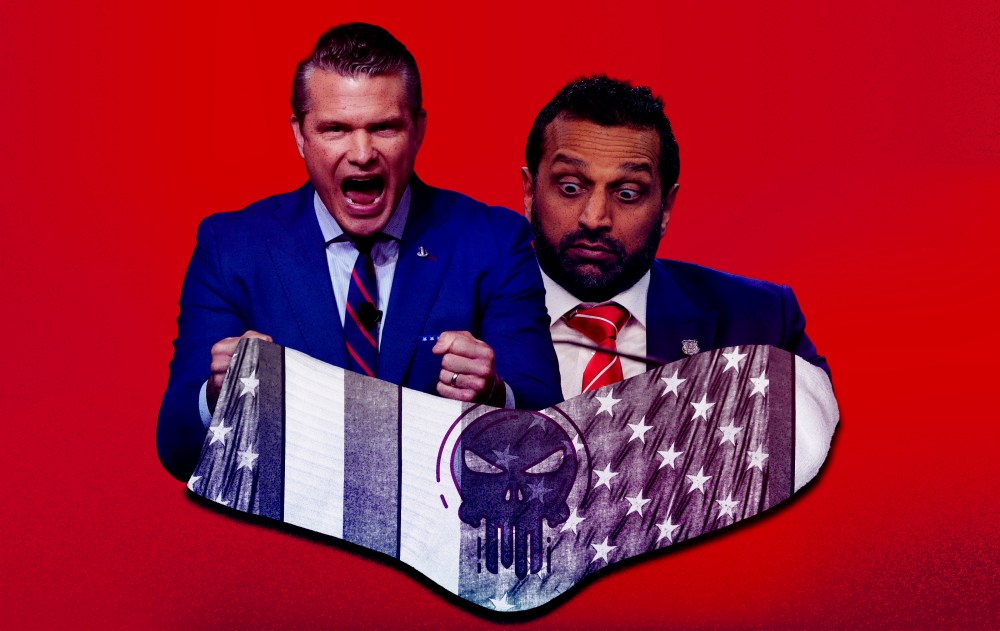One of our editors told me a while back that he suspected me of being the so-called “Menswear Guy” on Twitter.
Why he thought this, I have no idea. The Menswear Guy’s identity isn’t a secret. Believe me, if I were capable of making a living by writing about clothes, I would have ditched American politics years ago and never looked back.
I do know a little about menswear, though. For instance, I know that “fun socks” are tacky. I also know that the heads of the two scariest agencies in the federal government are prone to wearing them.
FBI Director Kash Patel sported socks with the “Punisher” logo when he spoke at CPAC in 2022. The Punisher is a Marvel superhero but possesses no special abilities, as I recall. His superpower, such as it is, is ruthlessness. He’s a vigilante who’s willing to brutalize and murder criminals in the name of stopping crime, just the sort of mentality we should all want the chief of America’s heavily armed national police force to identify with.
I don’t know if Patel has donned the Punisher socks since taking over the bureau, but I do know that you can still buy a version of them from, ahem, Based Apparel, a company he founded. They come emblazoned with “K$H,” the sort of tag you’d expect from a 14-year-old graffiti artist.
Defense Secretary Pete Hegseth is less sinister in his choice of hosiery, preferring American-flag socks to ones featuring comic-book avatars of authoritarianism. But what he lacks in tastelessness below the knee, Hegseth makes up for above it. He’s been known to wear an American-flag belt buckle, an American-flag pocket square, and a suit jacket lined with an American-flag pattern—at the same time.
The last of which, per the Menswear Guy, was probably made in Thailand.
I don’t think it’s a coincidence that Patel and Hegseth are into “fun socks,” and not just any fun socks but fun socks designed to make a cultural statement. Both men are glaringly unqualified for the jobs they hold, both are pitifully insecure about that fact, and both are prone to overcompensating through corny displays of bravado. They’re culture warriors who’ve been thrust into momentous roles atop agencies that have no business participating in the culture wars, leaving them further at sea.
They’ve got something to prove but lack the skills to prove it, so they revert to their comfort zone, right-wing cultural signaling—American-flag attire to advertise hyper-patriotism in Hegseth’s case, burbling about seeing Charlie Kirk in “Valhalla” in Patel’s. It’s extremely adolescent, almost proudly unprofessional. And that’s no coincidence: More so than anyone in the administration except possibly the president himself, Hegseth and Patel are creatures of the juvenile Very Online media ecosystem they’ve long inhabited. They’re LARPing at the highest levels of power.
Which makes them, potentially, the two most dangerous men in government.
As a non-paying reader, you are receiving a truncated version of Boiling Frogs. You can read Nick’s full newsletter by becoming a member here.
A message from The Dispatch
Stay Ahead of the Curve With Dispatch Energy
The Dispatch’s newest weekly newsletter will dive into the politics, policy, and innovation shaping America’s energy future, presented by Pacific Legal Foundation. Featuring a rotating roster of contributors who are experts in their respective fields, each edition will feature incisive analysis on everything from oil and gas and permitting regulations, to renewables, climate, and the grid.
Adolescence.
Democratic leaders have their own challenge with being Too Online.
Kamala Harris didn’t campaign as a left-wing memelord, but she did saddle herself over the years with policy positions that only a left-wing memelord could love. Progressives punch far above their weight online, and a number of those punches landed with her and Joe Biden, from pressuring the White House into calling for an end to the filibuster to getting Biden to support a watered-down version of court packing.
Republicans have the opposite problem. They understand better than Democrats how voters prioritize policy issues and leveraged that advantage last year by promising a higher quality of life—cheaper groceries, less crime, a tighter border. Their problem (or, rather, America’s) is that the toxic norms of Very Online discourse, in which practically every top-tier member of the Trump administration is deeply submerged, are shaping the norms of how the federal government operates.
As an example, the Department of Homeland Security’s Twitter account is now indistinguishable from edgelord Internet bulletin board slop. On Wednesday, DHS posted a meme of “Giga Chad” wearing a U.S. Citizenship and Immigration Service baseball cap and fantasized about him rejecting applications for citizenship by persons deemed undesirable by MAGA. (“Globalist?” DENIED.) If you don’t know who “Giga Chad” is, well, that’s my point. Ask the nearest incel. He’ll know.
It’s enough here to observe that the agency in charge of America’s newly unaccountable immigration secret police force has begun to post things like “NOW ARRIVES THE HOUR OF ACTION” out of the blue. That’s ominous, and deliberately so, coming from an authoritarian president’s favorite department—but it’s perfectly normal by the standards of Very Online sh—posting. Maybe it’s supposed to scare you, maybe it’s supposed to make you laugh, maybe both. That’s government in 2025.
Another example: Last night, with the country still cooling off after Charlie Kirk’s murder and bracing for a shutdown, Donald Trump hopped onto Truth Social and posted this. “THE PARTY OF HATE, EVIL, AND SATAN,” the caption read over images of Chuck Schumer, Nancy Pelosi, Alexandria Ocasio-Cortez, and the Bidens. It may have been the first time in American history that a president has literally demonized his opponents. But there isn’t much ado about it today in the press, and why would there be? Images like the one Trump published are commonplace online, and we all understand that the president is very Very Online.
At this point, you might be tempted to mumble something about “mean tweets” and hand-wave away everything I’ve said as facts already in evidence since 2015. But the “mean tweets” matter. They matter because officials like Trump, Hegseth, and Patel who approach their jobs with the adolescent mindset of domineering bravado that characterizes online fantasy politics are destined to introduce the pathologies of that mindset into our quite real government.
Take, for example, another Truth Social post from the president last night, in this case a 67-second AI slop video about the shutdown set to “Don’t Fear the Reaper.” The reaper, in this case, is Russell Vought, the head of the Office of Management and Budget who is threatening to fire thousands of federal workers if Democrats don’t reopen the government immediately. The clip depicts Vought in a cloak, holding a scythe. Har dee har: That’s some fine lib-owning sh—posting, sir.
Except it’s not just sh—posting. Trump has been shockingly candid about exploiting the shutdown to hurt the other party’s supporters. “We’d be laying off a lot of people that are going to be really affected, and they’re Democrats; they’re going to be Democrats,” he told reporters on Tuesday. In shuttering federal agencies, he stressed that he intends to “get rid of a lot of things that we didn’t want. And they’d be Democrat things.” Those weren’t idle threats, either: The next day, Vought began canceling grants for energy projects in blue states while leaving grants for similar projects in red states untouched.
The federal government doesn’t typically use its power to punish the out-party as mercilessly as that, and if it does, the president doesn’t openly confess that that’s what he’s doing. The White House isn’t waging war here on Democratic politicians, after all, it’s waging war on blue-state residents, also known as Americans. That’s not supposed to happen in a democracy—but it happens all the time in online fantasy politics, where the two sides are “enemies” forever locked in mortal combat over the soul of the country.
I don’t think Donald Trump needed much encouragement to behave more ruthlessly as president than he’s naturally inclined to. But insofar as he did, the ethic of ruthlessness that defines the Very Online political discourse he luxuriates in may have supplied it.
A culture of provocation.
Another pathology of online fantasy politics is obsessing over internal enemies. There simply isn’t much clout to be gained on social media by thoughtfully dissecting threats from China, Russia, or Iran. If you want to draw a crowd and earn its adulation, demagoging “the enemy from within” is where the action is.
Coincidentally, that’s what the president is obsessed with. So is Hegseth, a man who seems to believe that the biggest problem with the military is wokeness and that America’s highest defense priority is drug dealers and illegal immigrants, not China. And so is Patel, who diverted FBI agents from counterterrorism duties to immigration tasks earlier this year before tensions with Iran forced him to reverse course. (No worries: Plenty of feds are still on the immigration beat after dropping their work on dismantling pedophile rings.)
It’s the opposite of surprising that two underqualified cronies like Pete and Kash who have been marinating for years in Very Online incitement about the enemy within have undertaken some of the most aggressive personnel purges of the second Trump presidency.
Another hallmark of online fantasy politics is hostility to establishment norms of all sorts. The medium really is the message in this case: The sort of person who’ll seek out Very Online spaces to vent their rage about whichever aspect of the status quo has infuriated them is by definition a person who won’t have patience for arguments about civic and legal restraints. It’s not an accident that our insane era of nihilistic populism emerged a few years after the internet supplied platforms practically engineered to cultivate such attitudes.
When I say that Hegseth and Patel seem almost proudly unprofessional, that’s what I mean. The defense secretary’s preference for fun socks may seem silly (and is), but it’s also a subtle way to signal disrespect for traditional norms of professional government conduct. Hegseth won’t be bound by staid expectations of proper attire when making decisions over life and death in the Situation Room, and he won’t be bound by staid expectations about punishing soldiers who commit war crimes. America’s keyboard warriors have spent years urging sympathizers like Pete Hegseth to “know what time it is” and Pete, now in the chain of command for a nuclear launch, listened.
Another way to put that is that Very Online culture rewards those who are willing to test boundaries. Twitter once policed right-wing provocateurs and banned those who crossed lines, but under Elon Musk it’s become the equivalent of a skinhead pub, with Musk himself occasionally competing to see who can most inflame the masses. On most online platforms, you needn’t worry anymore about being held accountable for what you say—at least if you’re right-wing. The culture is one of provocation: Go as far as you like in expressing your passion for your cause. (Passion is proof of political virtue, right?) Doing so will distinguish you as a “fighter” among fellow travelers.
“A culture of provocation” also happens to double as a nifty four-word summary of how the Trump administration operates. Just yesterday, the New York Times reported that the president has decided in his wisdom that we’re at war with drug cartels and therefore he’ll continue to bomb Venezuelan boats with impunity. Is that legal? No. Does it set a terrifying precedent in which military force might potentially be used against common criminals? Indeed, yes. (Why is Hegseth now attending events for law enforcement?) But the president and his defense secretary have been shaped by a Very Online culture in which there’s no downside to transgression. They won’t be held accountable for it—not by the quislings in Congress, certainly—and many, many right-wingers will applaud them for their bravado. As is true online, so too now in government: You can just do stuff.
There’s one more important pathology of online fantasy politics that overlaps with how Trump and his deputies govern. Very Online political discourse abhors complex thought.
There’s no market for it. Most of us don’t venture online in search of political content to be challenged or enlightened, we do it to have our prejudices flattered. We want silver-bullet explanations for social ills, and we want those explanations to affirm our priors in every particular. And we want them in bite-sized pieces, not endless screeds like you might find in, well, a Dispatch newsletter.
We’re becoming a postliterate society. In a postliterate society, sophisticated arguments aren’t merely disdained, they’re functionally impossible to make because the media through which we communicate information discourage nuanced thought. Is it any surprise that we have the leadership we have?
Kash Patel is a notorious conspiracy theorist. Pete Hegseth’s vocabulary consists of a noun, a verb, and the word “woke” or “lethality.” In the last week alone, Donald Trump has addressed America’s drug epidemic by bombing Venezuelan ships even though Venezuela isn’t a fentanyl hub; advised pregnant women to stop taking Tylenol for fear of autism even though that could raise the risk of their babies having autism; and accused Democrats of demanding health care for illegal immigrants even though neither he nor any other Republican seems able to explain precisely how they’re doing that. His preferred solution to virtually every economic problem is “more tariffs”—and when he finally got the chance to slap tariffs on the entire world in early April, he had to pause them within a week when they destabilized global markets.
In 10 years, I can’t think of a single policy proposal he’s made that he’s explained well, at length and in detail. At his debate with Harris last fall, after more than a decade of railing against Obamacare, the most he could offer when asked what the GOP would replace the program with is “the concepts of a plan.” He got elected based on a simple idea—“build the wall”—and he’s kept things awfully simple ever since.
If you worry that the Internet will bring about Idiocracy by first destroying Americans’ ability to digest complex arguments and then destroying their appetite for them, I regret to inform you that the era of fun socks is already here.
The perfect henchmen.
I don’t think the president is a diabolical authoritarian genius (Stephen Miller, on the other hand …), but I do see a keen intuition on his part in putting Hegseth and Patel in charge of the two arms of the government that can do more damage to his enemies than any other.
If you’re trying to consolidate power, you want weak men in roles like that. That was his problem in his first term. James Mattis didn’t need to wear fun socks to impress everyone with the ardor of his patriotism, as he had a chestful of medals to do that. In the end, when the time came for a coup attempt, Trump was surrounded by too many people who were just strong enough to say “no.”
He isn’t making that mistake again. The great advantage to him in Hegseth and Patel feeling so insecure in their roles is that all of their authority derives from him. They have no special talents or achievements of their own that might earn them the respect of their more qualified deputies. They’re poseurs, distinguished only by the degree of their servility, and so the only way they can get their underlings to take them seriously is to hug Trump tightly and trust that no one will dare make trouble for one of the king’s favorites.
The president owns them totally, and so their obedience to him will be total. They’ll never risk angering him and being dismissed, forfeiting the ersatz respect and social status they’ve gained by dint of their impressive titles. They’ll hide behind his political skirts forever. They’re perfect henchmen.
Beware the guys in fun socks with something to prove. You might be surprised by how far they’re willing to go to prove it.








Please note that we at The Dispatch hold ourselves, our work, and our commenters to a higher standard than other places on the internet. We welcome comments that foster genuine debate or discussion—including comments critical of us or our work—but responses that include ad hominem attacks on fellow Dispatch members or are intended to stoke fear and anger may be moderated.
With your membership, you only have the ability to comment on The Morning Dispatch articles. Consider upgrading to join the conversation everywhere.